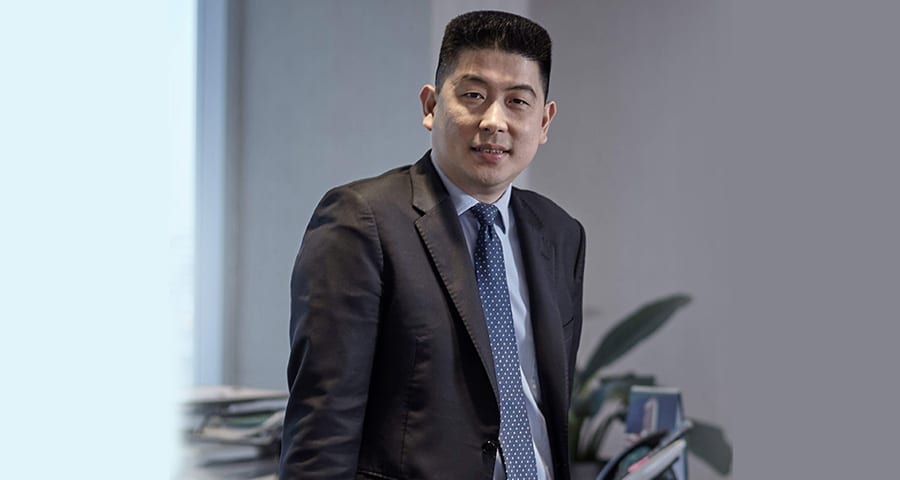
Edgar ‘Injap’ Sia II is Chairman and CEO of Double Dragon Properties Corporation. His company’s four pillars of growth are: provincial retail leasing (City Mall), hotels (Hotel 101, Jinjiang Inn), office leasing (Double Dragon Plaza / DD Meridian Park, Jollibee Tower) and industrial warehouse leasing (Central Hub) – – all projected to double their leasable space from some 600,000 square meters in 2018 to 1.2 million square meters by 2020. He was awarded the Mansmith Young Market Masters Awards (YMMA) in 2009 in recognition of his successfully founding the first barbecue fast food restaurant in the Philippines, Mang Inasal. He shares his insights about real estate, starting from leading the creation of a local hotel in Iloilo at age 19 to Double Dragon Properties.
Q1: Your big love is real estate. When you were just 19 years old, you built your first hotel in Iloilo together with 3 other friends, mostly from bank loan. Can you share with us lessons you learned from this early real estate venture that you are able to use now to benefit the development of DoubleDragon Properties?
A1: My early business ventures have been valuable preparation for me as I have been able to learn the ropes of business on the spot, we learned through first hand experience many aspects of the business, from spotting the opportunity, to scouting for the right location, how to put together a handwritten business plan, to talking to the banks and pitch the business plan, to preparing the project plans and permits on the ground, detailed execution of the project as fast as possible, hiring of people, to operating and running the business.
At 19, we started a new business with no previous business experience, so we just had no choice but to learn as we go, ask, observe and calibrate along the way. Looking back I think it is very important to really plan well, to deeply know the industry you are entering, to execute passionately, and anticipate ahead all the possibilities. I also think it is very important to always keep an open mind to learn, and to work with your team and partners to complete all the gaps that you may have along the way. I have also learned then the power of real estate value appreciation, if you carefully acquire the right property at the right time, your underlying string of hard asset value can grow 10 folds in 10 years, that excludes the rental income you generate from the property year on year. But it is very important to acquire the property at the right time, and at the right location, and acquire just few years before everybody else starts to buy in the same areas. Thats why for DoubleDragon we really give so much discipline and emphasis to acquire the string of prime commercial properties at the right price, at the right time, and at the right location.
Q2: You spotted the white space opportunity of community malls in third class cities while you were visiting or scouting for provincial sites for Mang Inasal. What did you notice about the potential of the different market segments of community malls within the third class cities you entered?
A2: As a country moves up and evolve from third world to first world, the various fragmented industries gets formalized one by one. For example, the transition from traditional retail to modern retail was well felt in the large Tier 1 areas of Metro Manila between the 1960s to the 1980s while medium Tier 2 areas such as Cebu, Naga, Iloilo, Baguio, Bacolod, Cagayan De Oro saw the first modern malls open in their regions between the 1990s to the 2000s. Smaller Tier 3 areas such as Cotabato, Kabankalan, Kalibo, Koronadal, Danao, Boracay, Sorsogon, San Carlos, Capiz, Dipolog and over a hundred more similar markets in the province that are only just starting to experience this transition, with CityMall at the forefront of it all. CityMall is the first modern retail platform in many of the provincial cities it serves enabling DoubleDragon to be ahead of the curve just as it happened in the past.
The same with Mang Inasal 15 years ago when the barbecue restaurant space was the still fragmented with various informal barbecue restaurants around the country, then Mang Inasal formalized that barbecue restaurant category and became the first barbecue fastfood chain in the Philippines.
Q3: You created a new fusion category in Mang Inasal and again in DoubleDragon, what are the top risks you identified in each new category? How do you mitigate these various kinds of risks, specially for a new category?
A3: I think the risk is more with the first 5-7 years of the business penetration, since you still have to co-exist with the current fragmented informal players, you have to find ways how to focus and stay in the course, so that you will be able to successfully navigate to full circle of the transition, and become the biggest beneficiary of the transition. It is normally challenging in the first few years, but it will be worthwhile because after the penetration and transition, your brand and business model will be able to dominate and own the new category for generations.
Q4: You frequently share about the importance of knowing the terrain, what exactly do you mean by that and what specific information do you look for?
A4: I firmly believe that it is very important for an entrepreneur to study and deeply understand the business terrain before you embark on your business stint. Because generally these industries are already dominated by the established players, so you really have to go deeper in understanding the specific industry, and try to peel off the superficial layers so that you can try to see through if there are gaps that you can anchor on to enable you to create a new caterory within the industry. Because if you will just build another of exactly the same as what the established players are doing, it will be too late to compete with them. I think the key is to find transitions that are just starting to form, coupled with the approaching presence of the other elements that will make the evolution happen. That way, once the transition becomes more visible, your business model is already there right at the middle of it all ready to capture and reap the long term benefits.
***
Josiah Go is chair and chief innovation strategist of Mansmith and Fielders Inc. He is also the co-founder, alongside Chiqui Escareal-Go, of the Mansmith Young Market Masters Awards (YMMA) since 2006. The search for the 19th Mansmith YMMA is currently ongoing. For more information, visit www.youngmarketmasters.com.


One thought on “Q&A with Double Dragon Properties Chairman Edgar ‘Injap’ Sia II on New Category Strategy”